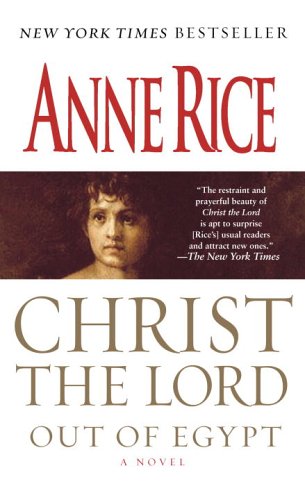The Republic-Plato

This classic work of literature was one that I had for some time been ashamed to have said I'd never read. Additionally, a recent blog entry of a friend referenced it, so I knew I needed to get off of my laurels and read it. Of course, I'd read the excerpts dealing with the allegory of the cave, but to take the whole of his argument for what its worth, and to feel the dialogue's progress in its natural fashion took work, but the work was well worth it. While Plato espouses some things that are strange, such as the dissolution of marriage relations to the point where individuals would be unsure of the identity of their parents, in order to foster a more communal sense of society, his thoughts on truth and tyranny make striking points about our world today.
Christ the Lord-Out of Egypt

I had wanted to read this book for quite some time, and bought the paperback copy about a year ago. We finally got around to reading this book and it was quite enjoyable. It covers the period of Jesus' life as a seven year old, from the time when he left Egypt and returned back to Israel. The crux of the book deals with how Jesus as a human boy would come to understand his divine nature. For some time it made me feel slightly uncomfortable to think that it's possible that he would be unaware of who he was, but then as I thought from my child's perspective of not fully understanding his place in the universe, it made more sense. Ultimately, whether Rice's speculations are accurate or not on the level of details, she accurately applies the truth that the mystery of the Incarnation unites the human with the divine without mixture of substances. I can't wait to get the sequel, which deals with the life of Our Lord as a young man.
Don't Waste Your Life - John Piper

This small book by Baptist preacher John Piper deals with the fact that life is so short, and should not be wasted. It sounds obvious but the sad fact is that in our society so many people are wasting their lives. I was expecting more glaring commentary on the ways in which our society is guilty of this crime, especially as the back cover includes a great example of how most people think that an ideal retirement is spent doing nothing. However, it stays more focused on a positive view of life's meaning. Perhaps Piper's positivity is more palatable to more people, but it didn't get to me really.
What's Wrong With The World - G.K. Chesterton

This book has a very audacious title, with an even more bold message. In it, Chesterton critiques almost every facet of society, from government to family to education to feminism. While some of his views were shocking at first, he did his usual charm and opened my mind. At the end of the day, he argues that the ideal should be our basis for judging something. His closing thought that shows that our society is flawed based on the redness of a poor girl's hair is enough to make you want to cry because of the beauty of his writing, and the fact that we neglect the poor.
Biography of St. Thomas Aquinas - G.K. Chesterton

I finished the first book in this two-book volume this month, reading about the life and views of a man who has proven to be quite enigmatic. I had started reading R.C. Sproul's book Classical Apologetics, which explains the view of those who think Thomas Aquinas got things right. However, as I was reading I thought that it would be better to go straight to the source. When I saw how large most of Aquinas' books were, I realized I should stick with my current favorite writer, G.K. Chesterton, whose biography of St. Thomas has been hailed as the finest by such modern Thomists as Jacques Maritain and Etienne Gilson. At any rate, Chesterton's exposition of what Thomas accomplished made me hungry to learn more about this man's perspective on the world. Chesterton's grasp of the problems of philosophy is as wide as his view of the world, and I can only hope that my eventual readings of Aquinas are as exciting as Chesterton's take on the man and his project.
The Phenomenon of Life: Towards a Philosophical Biology - Hans Jonas

This collection of essays by Hans Jonas, former student of Heidegger who parted ways with him due to Heidegger's refusal to denounce Hitler, applies the basic principles of St. Thomas to the way most biologists look at life. His writing is quite dense with philosophical language [this sentence is a case in point: Concerning the single particle, then, the traceable steady presence in the continuum is the sole operational meaning of "identity", and the traced "path" is its complete verification: no obvious claim to an internal principle of identity, such as retentive historicity or protentive urge for "self"-preservation, issues from its manner of inert permanence.] This is definitely one that cannot simply be read, but must be reread as one goes, and as one thinks back to particular issues. My favorite essay was "Is God a Mathematician?" I think he raises many very important points when one considers theology and biology and the mess that often arises when they clash.





















